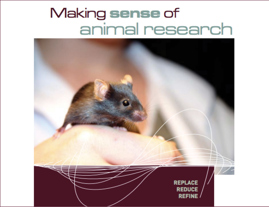Animal Use and Welfare
Animal studies continue to play an invaluable role in the medical research process in the development of drugs and treatments to improve the quality of life for humans. The Pharmaceutical sector goes beyond compliance to ensure high welfare to the animals used and implementation of the 3Rs during this process.
Only when it is necessary and unavoidable, animals are used for research to help scientists bridge the gap between the theories developed and the reality of introducing a new treatment to the patient. It is legally required that new medicines ensure maximum safety to humans, making the use of animals an essential step in the medical development process. So, in short, without animal testing, there would be no new medicines.
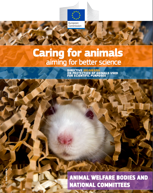
Use of animals in testing and research is highly regulated at both EU and Member State levels. The latest legislation regulating use of animals in research passed at EU level in September 2010 came into force on 1 January 2013 and makes the 3R principles a legal requirement (Directive 2010/63). The Directive sets full replacement as a long-term vision and sets the most stringent protection framework worldwide to protect animals that would still need to be used after application of alternative research methods.
- Recording of the EFPIA/RSPCA webinar on Animal Welfare Body - A catalyst for progress 18 June 2021
- Evaluating opportunities to enhance the implementation of selected welfare and 3Rs provisions of Directive 2010/63
- Blog: EU legislation and science further the protection of laboratory animals
- Directive 2010/63/EU: facilitating full and correct implementation
- Animal Welfare: Your questions answered
- Report from the Commission to the European Parliament and the Council on the implementation of Directive 2010/63/EU on the protection of animals used for scientific purposes in the Member States of the European Union
- Report from the Commission to the European Parliament and the Council 2019 report on the statistics on the use of animals for scientific purposes in the Member States of the European Union in 2015-2017
- NEW - Q&A explaining the EU report on the use of animal statistics
- European Union Reference Laboratory for alternatives to animal testing
- European Commission DG ENVIRONMENT
- FEAM Forum round table on animals in science
- NEW: EFPIA/EARA response to EURL ECVAM Recommendation on Non-Animal-Derived antibodies
Pharmaceutical industry and 3Rs
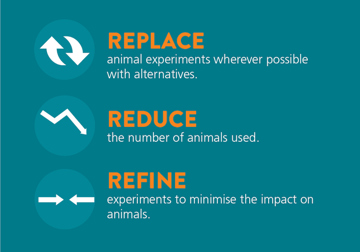
Animal research raises dilemmas not only for scientists and organisations that use animals as part of their research projects, but also for society as a whole. Applying alternative methods may lead to significant reduction in animals used, however, most of these methods are not yet able to fully replicate the complexity and reactions of a living organism especially for systemic and chronic conditions. However, they are already widely used by scientists to inform their research programs and, being complementary with others, address the scientific questions for the progress of medicine.
EFPIA members are committed to the science-based phase-in of methods to replace the use of animals for scientific purposes and the deletion of animal tests which are obsolete or redundant. EFPIA members aim to lead progress on this by engaging in a wide range of practical activities to help drive the development, uptake and promotion of non-animal technologies (NATs) and new approach methodologies (NAMs) so that these can be phased-in as soon as it is scientifically possible to do so.
Animal welfare and 3Rs principles in action
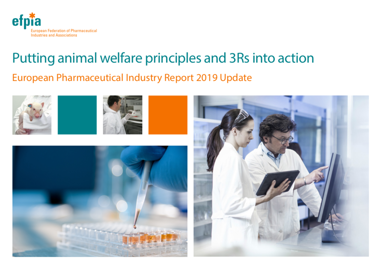
- Are fully committed to the principles of 3Rs;
- Continue to support the objectives of the Directive 2010/63/EU on the protection of animals used for scientific purposes which has enhanced animal welfare standards and mandated the application of replacement, reduction and refinement across the EU while ensuring Europe remains a world leader in biomedical research;
- Will continue to strive to go beyond what is legally required and work to develop and validate systems leading to improved 3Rs, animal welfare and high-quality science and technologies in every day practice and ultimately improve the lives of the people and animals that stand to benefit from the research. Training of staff will remain an essential element of good science and good welfare;
- Are committed to continue invest in collaborative research initiatives and projects to improve animal welfare and 3Rs, and support start-ups with expertise in new approaches as we transition from the Innovative Medicines Initiative (IMI – the largest health public private partnership) to the new Innovative Health Partnership;
- Will continue to work with regulators, the scientific community and civil society to improve implementation of the science and speed up regulatory acceptance of alternative methods in the EU and at a global level;
- Will strive to lead by example by disseminating beyond own department and own establishment to drive improvements in welfare and general quality of science;
- Will improve the systems in place working with academia, CROs, animal breeding and testing facilities to share good practices, new methodologies and lead by example by uptake of high 3Rs and animal welfare standards in the daily activities;
- Will be transparent in telling what we do and how we do it, to explain and justify where live animals are required and used and also inform on the work and commitment of companies to reduce the sectors reliance on animals;
- Will continue to identify, develop and implement their phase-in strategies and communicate on animal use through either dedicated webpages or CSR reports. Open communication and dialogue with the public are key to highlight our contribution to phasing-in replacement methods.
- Report 2022: Putting animal welfare principles and 3Rs into action get_app
- Putting animal welfare principles and 3Rs into action get_app
- Report 2019: Putting animal welfare principles and 3Rs into action get_app
- Report 2016: Putting animal welfare principles and 3Rs into action get_app
- Report 2015 Update: Putting animal welfare principles and 3 Rs into action get_app
- Report 2012 Update: Putting animal welfare principles and 3 Rs into action get_app
- Report 2011: Putting animal welfare principles and 3Rs into action get_app
Culture of Care
Directive 2010/63/EU aims to improve the welfare of animals still needed in scientific research by, amongst other things, enhancing the Culture of Care, referred to as the “climate of care” in Recital 31. Establishing, promoting and maintaining a good culture of care is a fundamental component if ethical, scientific and animal welfare obligations, along with wider responsibilities towards employees and the public, are to be met.
EFPIA members have been reflecting on the concept of a Culture of Care and how it is understood and applied across research institutions and companies in Europe - a “checklist” to help engage in or enhance discussions on a Culture of Care within your establishments.
A Framework has been developed with the aim to help organisations identify gaps or potential areas for improvement in support of a positive Culture of Care. The framework is intended as an aid for continuous improvement, highlighting where indicators of good practice are present within companies with the objective to be used as a starting point for consideration and discussion.
EFPIA organised a workshop with the pharma user community to enable an open discussion across industry on the concepts and importance of effective experimental design. A report was prepared following the workshop and now industry is working on implementing the recommendations.

The primary objective while ensuring that legislative requirements are met, should be that animals are transported in a manner that does not jeopardise their well-being and ensures their safe arrival at their destination in good health, with minimal distress or fear which is important to ensure good animal welfare and the validity of scientific procedures.
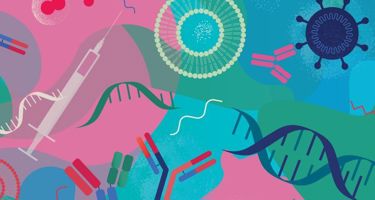
Featured event
Accelerating Global Deletion of the Abnormal Toxicity Test. Planning common next steps.
Organised by AFSA/HSI and EFPIA in collaboration with IABS, the workshop aimed to assess the lingering barriers, to reach a shared agreement on further concrete actions to make the deletion of the test a global concrete achievement.
View Event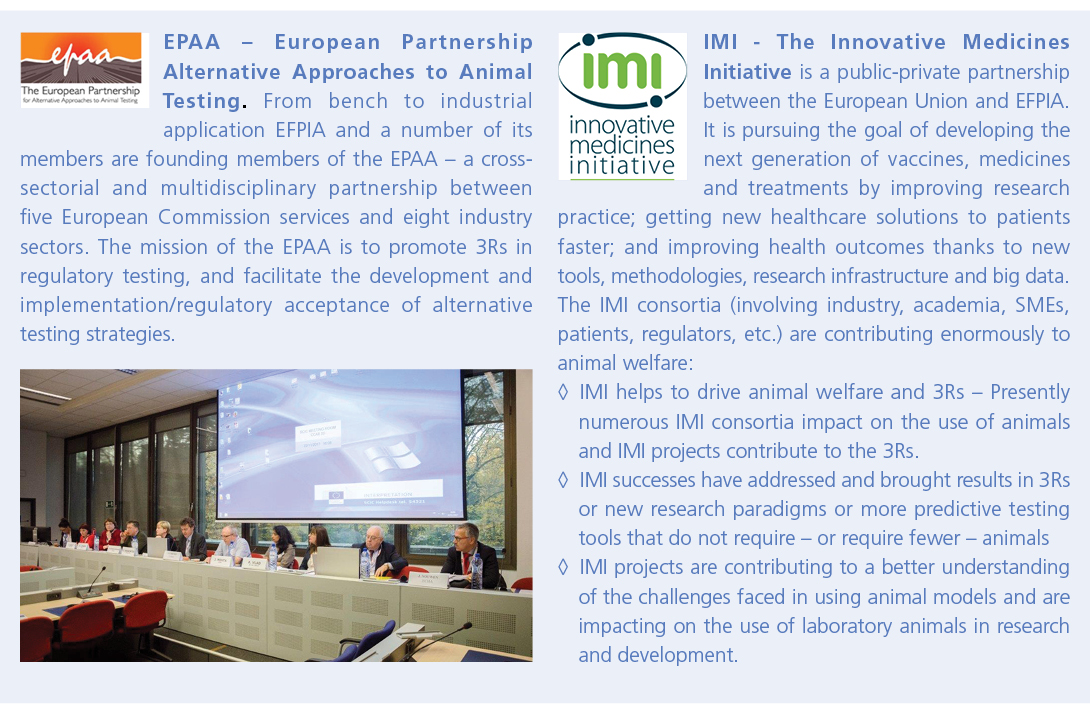
NEW - Fitting vaccine research into one year - Were animals used?
European Partnership for Alternative Approaches to Animal Testing
On the Innovative Medicines Initiative: here and here
A Review of the Contributions of Cross-discipline Collaborative European IMI/EFPIA Research Projects to the Development of Replacement, Reduction and Refinement Strategies
For more information, contact:
Kirsty Reid, Director Science Policy
Kirsty.reid@efpia.eu
